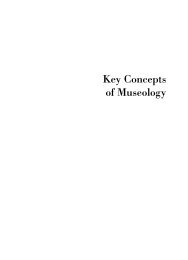ISS 25 (1995).pdf - The International Council of Museums
ISS 25 (1995).pdf - The International Council of Museums
ISS 25 (1995).pdf - The International Council of Museums
You also want an ePaper? Increase the reach of your titles
YUMPU automatically turns print PDFs into web optimized ePapers that Google loves.
heritage as community appropriation, with the<br />
differentiation between ' national ' and ' global '<br />
heritage ( R. Montpetit ), and also to the elaboration<br />
<strong>of</strong> the idea <strong>of</strong> museum and <strong>of</strong> the concept <strong>of</strong><br />
community ( T . C. Sheiner ) . This approach shows that<br />
there can be no consensus in defining 'community ' or<br />
'museum ' either. <strong>The</strong> only common point appears to be<br />
the diversity <strong>of</strong> meanings and the wide scope <strong>of</strong><br />
problems which can arise in relation to the concepts<br />
<strong>of</strong> museum and community.<br />
Very different approaches are established in<br />
the papers in which the authors try to support their<br />
theoretical statements with the real practice. On<br />
one side there is the universal question <strong>of</strong> power by<br />
which museums can control mental territories and<br />
play the important role in maintaining the identity<br />
<strong>of</strong> the community as interpreted by M. Horta by some<br />
actual examples taken from the southern region <strong>of</strong><br />
Brazil, while on the other side there is a close and<br />
strict European analysis <strong>of</strong> H. Vieregg who on the<br />
basis <strong>of</strong> W. von Humboldt's theory, analyses the<br />
possibilities <strong>of</strong> the representation <strong>of</strong> contemporary<br />
history in museums using the term community in the<br />
sense <strong>of</strong> audience .<br />
<strong>The</strong> African problem is raised very clearly, It<br />
could be summarized in the questions: is the<br />
European model <strong>of</strong> museum adequate for African needs<br />
and are the existing museums in Africa able to<br />
realize the possibility <strong>of</strong> close connection with<br />
their communities,<br />
Let us very<br />
Stavanger papers<br />
ending with the<br />
countries.<br />
shortly give the essentials <strong>of</strong> the<br />
starting with the theoretical and<br />
particular examples from various<br />
Eurydice An tzoula tou-Retsila from Ionian<br />
University in Greece, in her paper ' <strong>Museums</strong> and<br />
Communities: Coping with Dilemmas. Or: Between<br />
Huseomania and Museotherapy ' accentuates that the<br />
awareness <strong>of</strong> the social role <strong>of</strong> museums has changed<br />
from the 1vory tower ' mentality to the sharing<br />
power with segments <strong>of</strong> a larger civic whole . Putting<br />
many questions about the role <strong>of</strong> museums in the<br />
society she states that museums have to shift from<br />
' monologue to conversation'. She insists on a deep<br />
pr<strong>of</strong>essional devotion <strong>of</strong> museum people and "a clear<br />
sense <strong>of</strong> responsibility to their communities" aiming<br />
to understand the nature and flexibility <strong>of</strong><br />
individual and group identities.<br />
Hathilde<br />
recherche des<br />
museums for<br />
development <strong>of</strong><br />
Bellaigue from Laboratoire de<br />
musees de France in her paper "Which<br />
which communities?" explains the<br />
museums in Europe and states that<br />
11
















